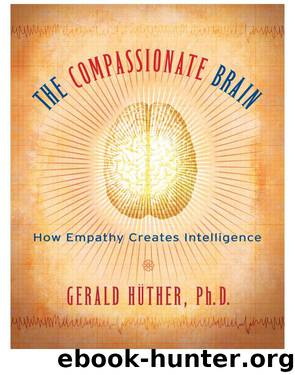The Compassionate Brain by Michael H. Kohn

Author:Michael H. Kohn
Language: eng
Format: epub
Publisher: Shambhala Publications
3.2 Defective Installations
At the time of birth the human brain is still quite immature. The only neuronal connections that are adequately developed are those that are absolutely essential for survival during the first phase of life—those required for regulation of basic body functions, for processing essential sense perceptions, and for coordinating the first motor reactions. Their most important overall function is to set in motion a reaction suitable for restoring lost inner balance when threats and disturbances occur. The more clearly a child is able to express either its discontent over an unsatisfied need or its contentment over a satisfied one, the better this process works. The first kind of expression normally brings someone to its side who will help. The latter kind reinforces the likelihood that willingness to provide help will continue to be there in the future.
These two skills are not equally present in all children. And not every mother is capable of accurately interpreting the signals through which her child indicates the state it is currently in. All mothers are also not equally good at recognizing and eliminating the cause of their baby’s current problem. All mothers are not equally good at recognizing the joy a baby expresses when it has succeeded in recovering its inner balance, and what is more important, all are not equally good at providing a reaction that their child can recognize and that responds to and reinforces its joy.
There are children who enter this world with much more fear than others. And there are children, who following their birth, encounter conditions that are not conducive to developing a sense of security. These children have less confidence than others about their ability to eliminate a disturbance to their inner balance through their own effort and with the help of their mother—and less confidence that they can share their joy over this successful enterprise with her. There are psychologically disturbed mothers, immature mothers, unhappy and discontented mothers, insecure and fearful mothers who are plagued by self-doubt, moody and fickle mothers, overly self-centered mothers, or mothers who are overly controlled by others. There are troubled and overburdened mothers, hard and insensitive mothers; there are disoriented mothers and mothers seeking orientation—there are simply all kinds of mothers who cannot provide the conditions their children need for optimal development. Instead of a secure, supportive bond, there arises between them and their children a very uncertain kind of bond. The child is either too much clutched and clung to and thus hindered in developing its abilities, or it is left too much to itself and receives too little stimulation and guidance in developing its abilities.
The consequences for the further development of a child’s brain of this kind of uncertain bond with the primary caregiver can become serious and long lasting if the child does not subsequently have an opportunity to develop close emotional ties with other people. This is usually the case if the mother herself has few such bonds with other people, for example, if her relationship
Download
This site does not store any files on its server. We only index and link to content provided by other sites. Please contact the content providers to delete copyright contents if any and email us, we'll remove relevant links or contents immediately.
The Art of Thinking Clearly by Rolf Dobelli(8841)
Mindhunter: Inside the FBI's Elite Serial Crime Unit by John E. Douglas & Mark Olshaker(7833)
Change Your Questions, Change Your Life by Marilee Adams(6640)
Nudge - Improving Decisions about Health, Wealth, and Happiness by Thaler Sunstein(6633)
Mastermind: How to Think Like Sherlock Holmes by Maria Konnikova(6234)
The Power of Now: A Guide to Spiritual Enlightenment by Eckhart Tolle(4753)
Men In Love by Nancy Friday(4320)
Factfulness: Ten Reasons We're Wrong About the World – and Why Things Are Better Than You Think by Hans Rosling(4021)
The Confidence Code by Katty Kay(3566)
Thinking in Bets by Annie Duke(3530)
Man and His Symbols by Carl Gustav Jung(3315)
Three Women by Lisa Taddeo(2919)
The Worm at the Core by Sheldon Solomon(2917)
Why Buddhism is True by Robert Wright(2826)
Liar's Poker by Michael Lewis(2810)
The Inner Life of Animals by Peter Wohlleben(2765)
Descartes' Error by Antonio Damasio(2731)
The Power of Mindful Learning by Ellen J. Langer(2710)
The Slow Fix: Solve Problems, Work Smarter, and Live Better In a World Addicted to Speed by Carl Honore(2574)
